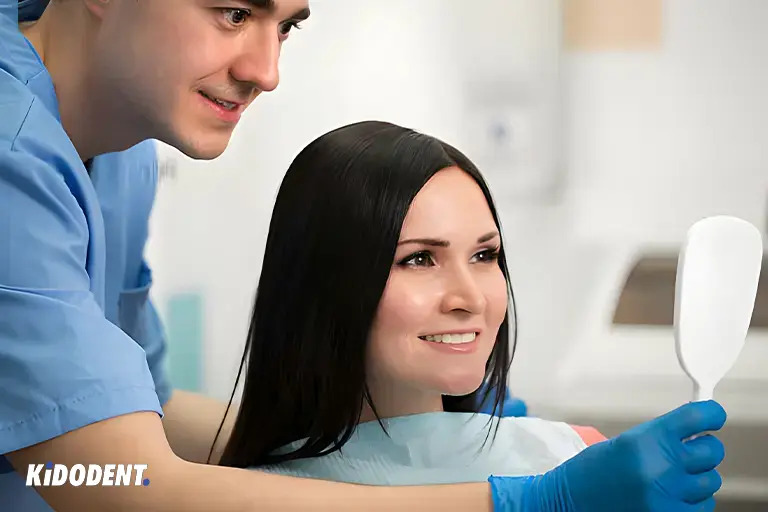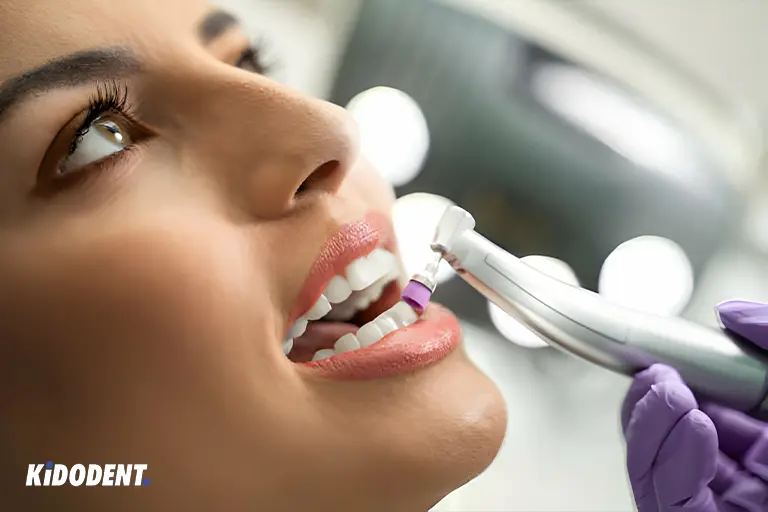Teeth polishing is one of the best and risk-free procedures that have brightening and whitening effects on your teeth. It is a pain-free procedure done by dentists with polisher tools and pastes. An attractive smile with white and bright teeth is everybody’s wish. To get to those wishes, it is worth it to know about dental polishing.
Smoothing teeth with dental polisher devices at the dentist’s office is an easy and quick way to give you a younger smile and appearance. Dental polishing procedure has been performed by dentists to remove tartar, plaque, and stains for years. Therefore, it is a safe and easy way to get those pearly bright teeth you have been thinking of. Polishing teeth has been carried out as a finishing process on dental restorations and also along with scaling teeth to achieve stain-resistance, light-reflecting teeth for very long.
What is dental polishing?
Teeth polishing or dental polishing is a cosmetic procedure to smooth the tooth surface. Polishing is done by the dentist in a single visit. When you visit a dentist for this procedure, you should know that polishing teeth comes after a scaling tooth is performed. In the first step of dental polishing, a dental hygienist cleans and rinses your teeth to remove debris in your mouth.
Then the dentist checks for any enamel erosion and damage to your teeth. If you are qualified, your dentist goes to another step which is called scaling. Through scaling, plaque and tartar on the surface of your teeth are removed. Dentists use a rubber dam to prevent plaque and infection from getting into your oral cavity or on the gums.
The final step is polishing teeth, which is done using polishing paste and rubber cups or air polishers depending on the types of tools that are necessary for the process. These tools include different brands of polishing pastes, ultrasonic removal devices, or discs and strips.
What are the benefits of teeth polishing?
Dental polishing has many benefits for your oral health. The main advantages are:
- If you polish your teeth, you will have much higher self-confidence and self-esteem because of the healthy and great look of your teeth and appearance.
- This cosmetic treatment prevents plaque buildup and accumulation of tartar on your teeth.
- It will get rid of stains on your teeth.
- Polishing teeth smoothen the rough surface of your teeth. So, food particles and debris have less chance to stick to your teeth.
- Teeth scaling and polishing work hand in hand to achieve whiter and brighter teeth.

Best at-home polishing techniques for brightening teeth
Dental polishing and tooth scaling are procedures that must be done by a dentist or a hygienist at the dental visit. For home polishing of your teeth, you can try abrasive toothpowders or toothpaste to remove plaque and stains from the surface of your teeth. Be sure to ask your dentist before using home polishing kits like toothpastes and rough toothbrushes.
Because using these at-home polishing ways without knowing your enamel condition and the health of your teeth may not be a good idea. Keep in mind that if you use too much abrasive toothpaste and powders, it can cause tooth sensitivity and you will damage the enamel of your teeth. So, it does more harm than good.
People ask about baking soda as a home polishing for brightening teeth, but it is not a safe polishing home kit and you should avoid that. So, consult your dentist for any at-home polishing product. Your dentist will prescribe better polishing techniques by knowing the types of stains and enamel condition of your teeth.
Can teeth polishing remove all types of stains on your teeth?
Sometimes dental polishing is not a single practical solution for removing all types of stains on the teeth. Thus, you may undergo more procedures and dental work if you have deep intrinsic stains that are the result of many years of tooth decay or maybe systematic diseases.
Stains can have many causes and are in different colors and types. Dental polishing is just useful for extrinsic or outer stains like:
- Tobacco and stains caused by smoking
- Food and drinking stains like red wine and high-sugary foods
- Tea or coffee stains
- Other not-so-deep stains that are caused by caries
But these stains can’t be removed by polishing:
- Stains that are caused by systematic diseases
- Inherited disease stains
- Stains that are caused by special medications like tetracycline ingestion
- Stains that are caused by deep cracks in deformed and broken teeth
How does dental polishing help your filling last longer?
If you have a broken or damaged tooth, you have probably taken a restoration or a filling treatment. However, any filling or restoration on broken teeth can’t be long-lasting and durable without polishing at the end. Dental polish is a beneficial part of any restoration and filling teeth that make them durable and smooth in your mouth. Thus, polishing tooth helps smoothen away those rough edges on composite veneers and makes the dental restorations and tooth fillings as durable as possible.
